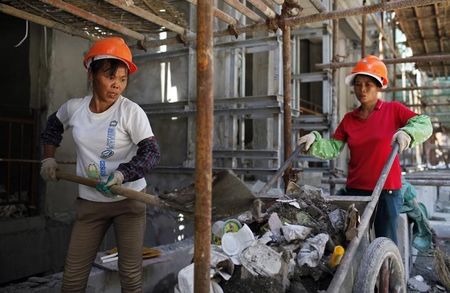China says to ensure ‘orderly’ rural-urban migration

BEIJING (Reuters) – China will ensure “orderly” migration of some 100 million rural workers into cities by 2020, supported by expanded social welfare and more job opportunities, the government said on Wednesday, as part of plans to push its urbanisation programme.
Chinese leaders have pledged to loosen their grip on residence registration, or hukou, to try to remove obstacles to the urbanisation drive. Such registrations prevent migrant workers and their families from getting access to education and social welfare outside of their home villages.
China’s leaders aim for 60 percent of the population of almost 1.4 billion to be living in cities by 2020, turning millions of rural dwellers into consumers who could be a driving force for the world’s second-largest the economy.
The government will ensure “an orderly transfer of rural population into urban areas”, loosening household registration restrictions in smaller cities more quickly, according to a detailed guidance on the reform issued by Cabinet.
The government will “strive to achieve the transfer of around 100 million agricultural population and other resident population into cities and towns” by 2020, the guidance said.
China’s 269 million rural migrant workers include some 166 million who have already entered cities.
Local governments will set differentiated household registration policies based on their ability to absorb migrants and provide public services, according to the guidance.
Migrants can settle in small cities freely as the hukou restrictions will be abolished, but curbs in medium-sized cities will be loosened “in an orderly way”, the cabinet said.
The number of migrants moving into big cities with populations of between 3 million and 5 million will be “appropriately” controlled. Movements into mega cities with more than 5 million people will be “strictly” controlled.
Policies will favour rural migrants who have worked in cities for a long time and skilled workers who are more competitive in the labour market, according to the guidance.
Beijing has also pledged to push land reforms that would allow farmers to lease or sell land when they leave villages.
The government will expand the coverage of pensions, medical care for migrant workers entering cities and ensure equal access to education for their children, the cabinet said.
It will also coordinate the development of urbanisation and industrialisation, it said, signalling concerns about the lack of jobs that could hamper the migration process.
The government is struggling to balance goals such as encouraging the migration of millions of former farmers into cities, while avoiding the slums and unemployment problems that have occurred in other countries experiencing similar migration.
(Reporting by Kevin Yao)